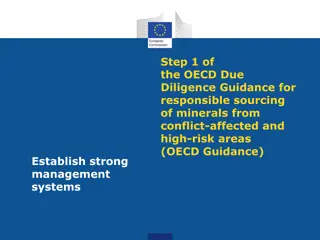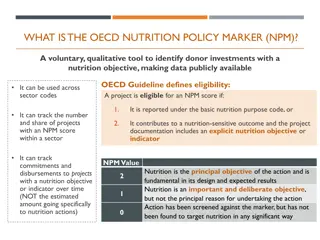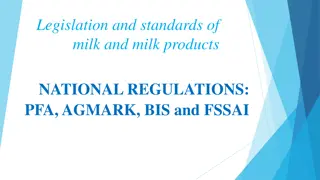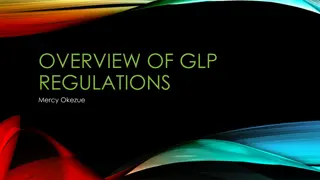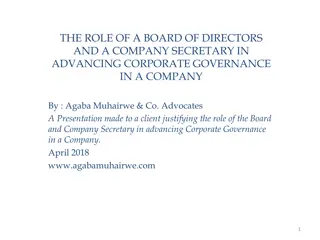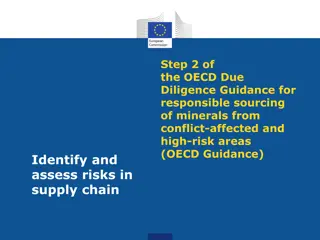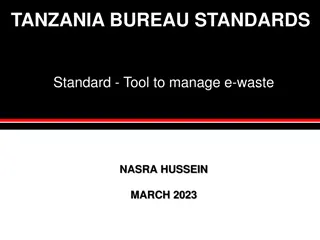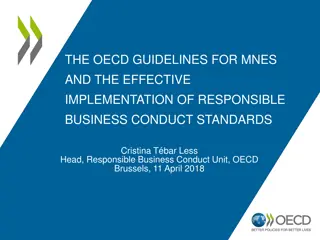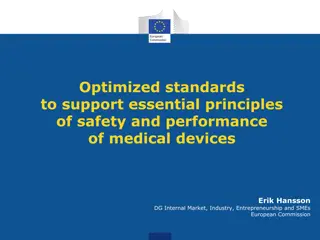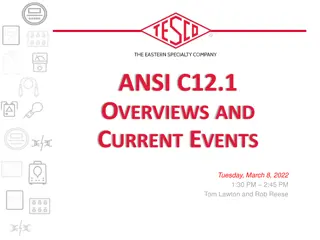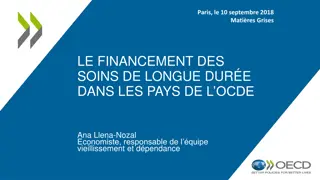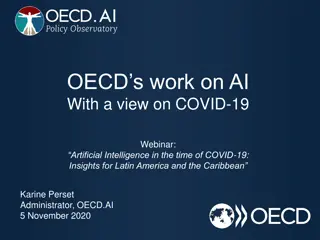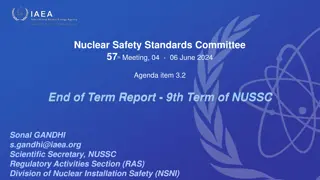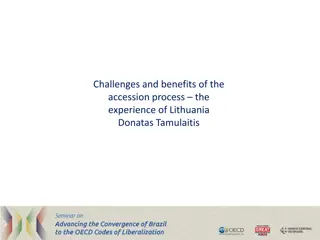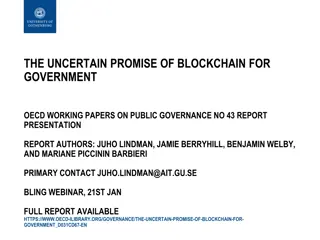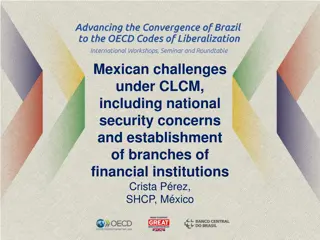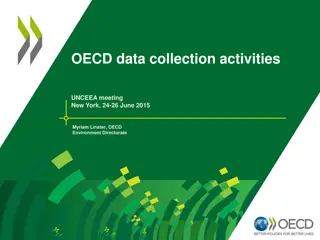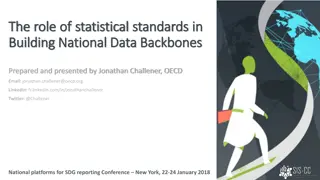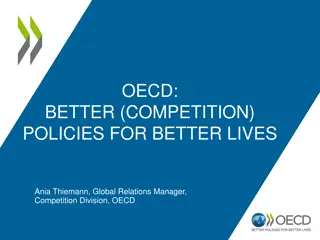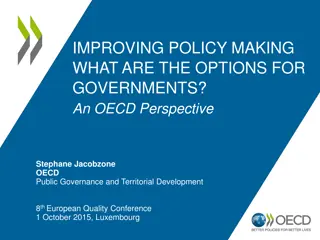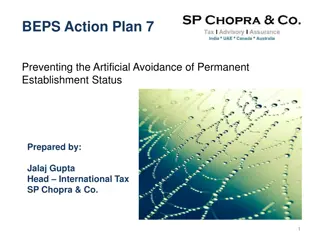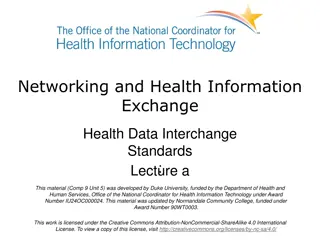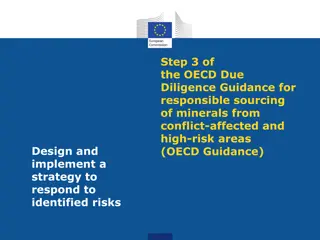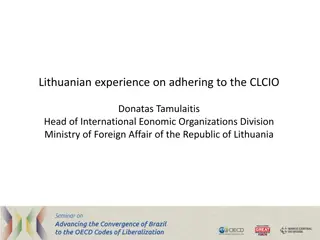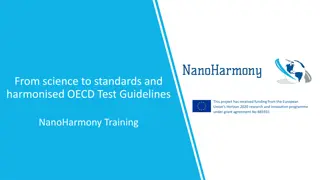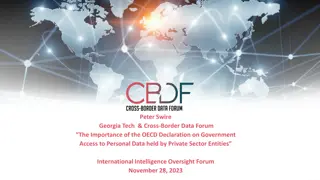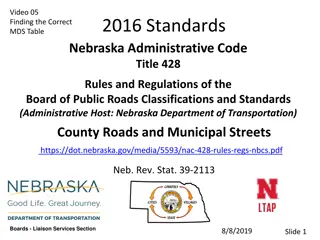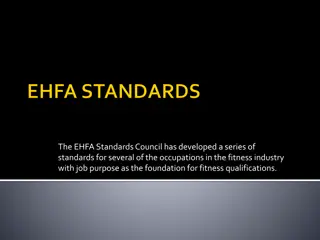Achieving Effective Delivery of Infrastructure Projects: Insights from OECD Seminar
Infrastructure investments play a crucial role in global development, but their successful delivery is becoming increasingly complex. Issues such as governance, ownership, and policy responsiveness can impact project outcomes. Without strategic management, projects may face challenges like inadequat
0 views • 24 slides
Progress on Development of Code of Conduct for Special Advisers Presentation
Presentation to the Select Committee outlines the overview, dispensation vs OECD standards, elements of the code of conduct, and the draft code emphasizing adherence to the Constitution, ethical conduct, and official duties for Special Advisers in South Africa. It focuses on promoting a capable and
1 views • 10 slides
Functional Safety and Cyber Security International Standards Update
This update covers various international standards related to functional safety and cyber security, including protocols like CSMA/CD, CSMA/CA, TSN, as well as standards for safety engineering tools and safety modules. It also highlights the collaboration with BSI standards for developing industry st
3 views • 16 slides
SUSTAINABLE WATER USE FOR GREEN HYDROGEN PRODUCTION: PRELIMINARY INSIGHTS FROM OECD WORK IN MONGOLIA
Preliminary insights from OECD work in Mongolia discuss the impact of green hydrogen production on water, sustainable approaches, and possible ways forward. The Sustainable Infrastructure Programme in Asia supports the transition towards net-zero infrastructure with a focus on enabling policies, pla
0 views • 14 slides
Challenges and Progress in Chilean Infrastructure Development
The challenges of Public-Private Partnerships (PPPs) in Chile within the framework of best practices and international standards are discussed, highlighting the need for long-term infrastructure planning and enhanced governance. The 2017 OECD Infrastructure Governance Review identified deficiencies
4 views • 40 slides
Challenges and Opportunities in Monitoring and Evaluation in OECD Countries
Monitoring and evaluation in OECD countries present unique challenges and opportunities, requiring clear mandates, ongoing processes, and robust institutional frameworks. The OECD approach emphasizes fostering quality, ensuring impact, and sharing lessons learned for efficient resource management. I
2 views • 12 slides
Overview of Internal Audit Standards and Accounting Standards
This content provides an overview of internal audit standards and accounting standards, emphasizing the importance of continuous professional development and updating in the field. It covers various accounting standards, including disclosures, valuation, revenue recognition, and more. Additionally,
5 views • 43 slides
Overview of Human Factors and Automotive Standards YouTube Series
This YouTube series, led by Paul Green from the University of Michigan, covers human factors and automotive standards. It includes topics like introduction to standards, core human factors standards, automotive human factors standards, human-computer interaction standards, and SAE vehicle standards.
7 views • 9 slides
OECD Due Diligence Guidance: Establish Strong Management Systems
The OECD Due Diligence Guidance outlines the importance of establishing strong management systems for responsible sourcing of minerals from conflict-affected and high-risk areas. This involves adopting company policies, engaging with suppliers, implementing grievance mechanisms, and utilizing the 3P
0 views • 13 slides
Understanding the OECD Nutrition Policy Marker (NPM)
The OECD Nutrition Policy Marker (NPM) is a voluntary tool to identify donor investments with a nutrition objective. It helps mainstream nutrition in large-scale programs to improve outcomes and accountability. The NPM is applied at the project level to track investments and promote transparency in
3 views • 4 slides
Milk and Milk Products: Regulations and Standards in India
The regulations and standards for milk and milk products in India are governed by national bodies such as PFA, AGMARK, BIS, and FSSAI. Legal standards set by the government ensure minimum requirements for quality, composition, hygiene, labeling, and packaging. Quality standards, like BIS and Agmark,
3 views • 36 slides
Understanding GLP Regulations and Implementation
GLP regulations were established in response to poor practices in toxicology laboratories, with a focus on ensuring quality in non-clinical health and environmental studies. The birth of GLP in the 1970s led to the development of international standards, outlined by the OECD Principles. GLP aims to
6 views • 11 slides
Understanding the Role of a Board of Directors and Company Secretary in Corporate Governance
Strong corporate governance is crucial for business performance, as it involves the system of rules, practices, and processes that direct and control a company. In Uganda, the Companies Act of 2012 governs corporate governance, with a voluntary code for private companies and mandatory for new public
1 views • 21 slides
Responsible Sourcing in Conflict-Affected Areas: OECD Guidelines
The OECD Due Diligence Guidance outlines steps for companies to identify and assess risks in mineral supply chains from conflict-affected and high-risk areas. It explains Conflict-Affected and High-Risk Areas (CAHRAs) and the importance of due diligence in responsible mineral sourcing to avoid finan
4 views • 16 slides
Tanzania Bureau of Standards: Managing E-Waste with Standards
Tanzania Bureau of Standards (TBS), established in 1975, plays a vital role in formulating and implementing national standards, including those for managing e-waste. Standards ensure quality, safety, and sustainability in materials, products, and services. TBS follows international best practices in
0 views • 22 slides
OECD Guidelines for Responsible Business Conduct
The OECD Guidelines for Multinational Enterprises provide a framework for responsible business conduct, encouraging sustainable practices and minimizing negative impacts. The OECD's work on responsible business conduct focuses on enhancing economic and social well-being globally, emphasizing ethical
1 views • 30 slides
Chile's Financial Services Liberalization Overview
This content provides an in-depth look at Chile's main reservations under the OECD Codes of Liberalization, including its context of accession to OECD Free Trade Agreements and commitments to liberalization in services, investments, and financial services. It covers aspects such as cross-border trad
5 views • 20 slides
Optimized Standards for Medical Device Safety and Performance in the EU
This report discusses the importance of harmonized standards in supporting the safety and performance of medical devices in the EU. It highlights the impact of drafting international medical device standards on EU legislation harmonization and emphasizes the role of harmonized standards under the EU
0 views • 8 slides
OECD Expert Group on Disparities in National Accounts Work Summary
The OECD Expert Group on Disparities in National Accounts focuses on developing methodology to produce distributional results for household income, consumption, and saving. Their work involves adjusting national accounts totals, identifying relevant variables from micro data sources, imputing missin
0 views • 15 slides
ANSI C12.1 Overview and Current Events
ANSI C12.1 standards are integral to the electric metering industry. The standards, managed by the American National Standards Institute (ANSI) and NEMA, promote voluntary compliance. NEMA plays a crucial role as the secretariat, overseeing committees that propose and review standards every five yea
1 views • 32 slides
Financing Long-Term Care in OECD Countries: Insights and Challenges
The funding of long-term care services in OECD countries poses significant financial and organizational challenges, with a growing proportion of the elderly population requiring such services. This article delves into the financing mechanisms, the public funding landscape, and potential reform pathw
0 views • 10 slides
OECD's Work on AI in Response to COVID-19: Insights for Latin America and the Caribbean
OECD is focusing on AI in the context of COVID-19, emphasizing the importance of trustworthy AI for societal benefits. The organization has outlined principles for implementing AI in policies, with a goal of fostering an ecosystem that prioritizes human rights, transparency, accountability, and more
0 views • 18 slides
NUSSC 57th Meeting - End of Term Report & Safety Standards Update
The 57th Meeting of the Nuclear Safety Standards Committee (NUSSC) concluded its 9th term with significant achievements including the approval and publication of multiple safety standards. Key highlights include the development of new standards such as SSG-3, SSG-88, SSG-89, and SSG-90 focusing on v
1 views • 8 slides
Challenges and Benefits of OECD Accession Process: Experience of Lithuania
The experience of Lithuania in the OECD accession process involves various objectives like national investment regime improvement, safeguarding measures, and coordination efforts with different ministries. Reservations and challenges in areas such as direct investment, real estate operations, and ba
0 views • 8 slides
The Uncertain Promise of Blockchain for Government - OECD Working Paper
This OECD working paper explores the potential impact of blockchain on government operations. Authored by Juho Lindman, Jamie Berryhill, Benjamin Welby, and Mariane Piccinin Barbieri, the report delves into the opportunities and challenges presented by blockchain technology in public governance. Juh
0 views • 19 slides
Challenges Faced by Mexico Under CLCM and Establishment of Financial Institutions
Mexico faced challenges related to national security concerns and the establishment of branches of financial institutions under the Codes of Liberalisation of Capital Movements (CLCM). The country's entry into the OECD in 1994 marked a significant period of liberalization and reforms, including exte
0 views • 13 slides
OECD Data Collection Activities Overview
OECD's data collection activities include interrelated work streams focusing on environmental data and indicators, database development, green growth, sectoral statistics, and regional analysis. The organization aims to provide comprehensive information to support policy-making and promote global co
0 views • 22 slides
Role of Statistical Standards in Building National Data Backbones
The role of statistical standards in constructing national data backbones is crucial for efficient data dissemination and reporting, especially in the context of Sustainable Development Goals (SDGs). Statistical standards guide the orchestration of information flows within a national statistical net
0 views • 22 slides
Development of Harmonized North American Life Jacket Standards
The development of harmonized North American life jacket standards led by Brandi Baldwin in the Lifesaving & Fire Safety Division at the Office of Design & Engineering Standards is a crucial regulatory process. It involves regulatory progress, standards development, consensus processes, and ongoing
0 views • 16 slides
Promoting Better Lives Through OECD's Competition Policies
The OECD's Competition Division works towards promoting fairer development, better education, healthcare, pensions, and employment through its outreach programs and global forums. The Global Forum on Competition engages participants from around the world to discuss topics like fighting corruption, p
1 views • 15 slides
Enhancing Policy Making: Options for Governments - An OECD Perspective
Various tools and approaches are discussed to improve policy making, including foresight, cost-benefit analysis, and regulatory tools. The changing context of policy challenges is highlighted, along with the OECD policy toolkit's modular approach. Strategies like talking to leaders, engaging stakeho
0 views • 20 slides
Understanding BEPS Action Plan 7: Preventing Artificial Avoidance of Permanent Establishment Status
The Action 7 Report aims to prevent artificial avoidance of Permanent Establishment (PE) status by making changes to the PE definition in the OECD Model Tax Convention. BEPS refers to tax planning strategies exploiting tax rule gaps to shift profits to low-tax locations. The OECD issued 15 action pl
0 views • 10 slides
Health Data Interchange Standards Overview
Explore the importance of data standards in healthcare, including HL7 standards, core requirements for data exchange, and choices for data interchange. Learn about HL7 v2 and v3 messaging standards, document standards, and the benefits of using HL7 v2 messaging standard. Understand why data intercha
0 views • 28 slides
Responding to Risks in OECD Due Diligence Guidance
Develop and implement a strategic response to identified risks in accordance with the OECD Due Diligence Guidance for responsible sourcing of minerals. The process involves reporting findings to management, devising a risk management plan, implementing the plan, and assessing ongoing risks. Mitigati
0 views • 7 slides
Opportunities to Mobilize Institutional Investment in Capital Markets
Aligning trillions of dollars managed by OECD institutional investors towards green infrastructure investments presents a significant opportunity. Currently, only a small percentage of large pension fund assets are directed towards infrastructure, with an even smaller fraction allocated to green pro
0 views • 4 slides
Lithuanian Journey Towards OECD Accession: Key Coordination Efforts
Lithuanian's experience in adhering to the CLCIO, coordinated by Donatas Tamulaitis, focuses on various processes including OECD accession, communication with Member states, management of recommendations, and more. The journey started in 2014 with the initial list of reservations and progressed thro
0 views • 14 slides
NanoHarmony Training: Standards and OECD Guidelines Overview
Delve into the world of standards and OECD Test Guidelines with the NanoHarmony Training material. Learn about harmonized test methods, the role of science in guideline development, engagement with OECD committees, and the process of creating OECD Test Guidelines. Explore how stakeholders can contri
0 views • 16 slides
Challenges and Importance of Government Access to Personal Data in Cross-Border Intelligence Oversight
Reflecting on the significance of the OECD Declaration on Government Access to Personal Data held by Private Sector Entities, this content delves into the drivers necessitating an OECD-type process, such as law enforcement needs, globalization of criminal evidence, and convergence of civilian commun
0 views • 8 slides
Understanding Nebraska's Road Design Standards
Explore the Nebraska Administrative Code Title 428, which outlines the standards and regulations for public roads in Nebraska, including county roads and municipal streets. Learn about terminology, acronyms, and design tables to find the appropriate standards for road and street work. Discover the p
0 views • 51 slides
EHFA Standards in the Fitness Industry
The EHFA Standards Council has developed a series of standards for fitness occupations, focusing on job purpose as the foundation for qualifications. EHFA provides guidance on standards for people, programs, and places in the health and fitness sector. Since 2003, EHFA has been setting standards for
0 views • 19 slides








